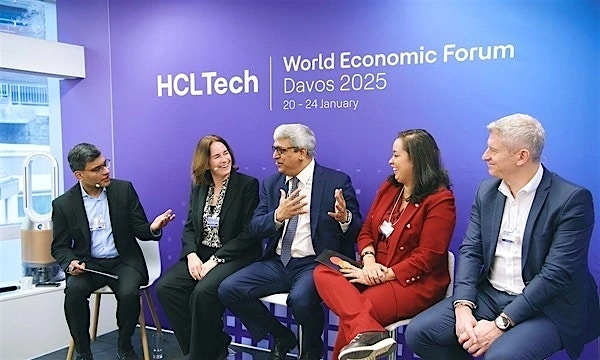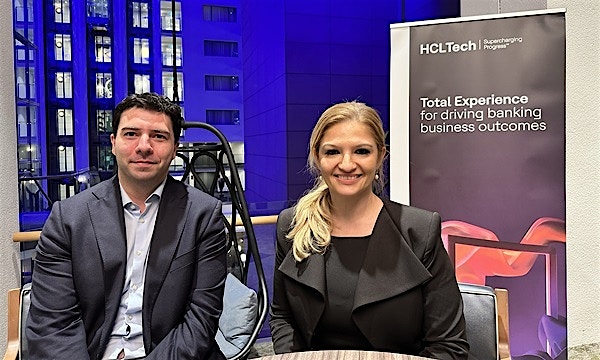Within the highly regulated financial services sector, upholding ethical standards and safeguarding the integrity of digital infrastructure is essential for trustworthiness, particularly when there’s a heavy reliance on data and AI models in business.
Technological change also causes disruption, but AI and other transformative technologies are likely to have a far bigger impact and could lead to a lot more turbulence. The significant progress made on this front is counterbalanced by the real concerns around bias, privacy] and intellectual property rights.
During a panel in the Ice Village at the World Economic Forum in Davos, Srinivasan Seshadri, Chief Growth Officer and Global Head, Financial Services at HCLTech, explored this topic and outlined how financial services organizations can build trust in banking.
Rebuilding trust in banking
The world is becoming a less trusting place and the majority distrust something until they see evidence that it’s trustworthy. Trust can take years to build, seconds to break and forever to repair. The need for trust is amplified by the sensitivity of dealing with people’s money, which calls for prudence, diplomacy and empathy.
Following the 2008 financial crisis, distrust between the consumer and financial services institutions was at an all-time high. And, today, distrust is enhanced by six core factors: misselling, perception of profiteering, data privacy concerns, inconsistent customer experience, lack of transparency and a rise in cyberattacks.
“The need for trust is even more important in the age of banking apps and social media,” said Seshadri.
Why does trust matter?
According to Seshadri, an increased trust in banking leads to real GDP growth with increased output, improved human capital and more money in investments. In banking, trust should be viewed as an integral element.
“With more money coming in, the confidence of people improves, and this leads to trust. It’s a virtuous cycle and the glue is trust,” he said.
Jayee Koffey, Senior Executive Vice President, Global Head of Enterprise Execution and Chief Corporate Affairs Officer at BNY Mellon, added: “Resilience should be a cornerstone of financial services. Resilience feeds trust. Without trust there is no vibrant or sustainable financial ecosystem.”
For Subhashini Chandran, Vice President, Social Impact, Asia Pacific at the Mastercard Center for Inclusive Growth, trust is the starting point for getting the unbanked engaged and included in the financial ecosystem.
Tech driving change
Technology has driven significant changes in financial services and the industry is often the first to adopt the latest emerging technologies. However, Seshadri advised that “trust through technology done well is more important than chasing the next big thing.”
He pointed to several examples, including:
- Data, cloud and cybersecurity for effective data governance, privacy and data availability
- AI, analytics and IoT for personalization at scale and intelligent solutions
- GenAI for fraud detection
- Blockchain for transaction integrity
- Quantum computing for cybersecurity, risk management and optimization
In today’s environment, “the combination of tech and people is a key part of trust,” according to Víctor Matarranz, Senior Executive Vice President and Head of Wealth Management and Insurance at Banco Santander.
On AI specifically, Koffey said: “We’re extremely excited about the potential of responsible AI and extending the core tenets of risk management.” She pointed to predictive trade analytics as a use case in production, where AI is applied to a vast dataset to allow clients – with foresight and visibility – to place increasingly successful trades, especially during times of market disruption.
“Trust remains foundational to AI implementation, and its critical for designers [of financial products], to digest how impactful AI can be, if we can make it work [without bias and while addressing data privacy concerns],” said Chandran.
To facilitate the transition to a trusted and tech-augmented industry, the panel agreed that clear and timely regulatory guidelines are needed. However, Mostapha Tahiri, Executive Vice President and Chief Operating Officer at State Street, commented: “Technology is moving fast and the cycle of change is faster than ever. The question is how we adopt technology quickly, without creating risks. Regulators and infrastructure need to catch up the speed of adoption of new technologies.”
Looking ahead, the risk and cost of moving legacy systems to new technology frameworks is significant. Adoption at scale is a challenge.
To navigate this environment, financial services organizations need to balance innovation with ensuring trust is maintained and fostered through responsible and ethical practices, especially when it comes to protecting sensitive client data and transparency with the integration of emerging technologies.





